Corporate Social Responsibility and Business Strategy: Unilever Report
VerifiedAdded on 2023/01/18
|15
|4189
|60
Report
AI Summary
This report provides an executive summary and in-depth analysis of Corporate Social Responsibility (CSR) with a specific focus on Unilever. It begins with an introduction to CSR, emphasizing its importance for multinational businesses in a global environment, and then discusses the characteristics of successful CSR implementation, including voluntary actions, managing externalities, and stakeholder orientation. The report uses Unilever as a case study, examining its strategic CSR approach, its commitment to employee development, and its alignment with the interests of various stakeholders like customers, investors, and suppliers. It explores the application of Carroll's CSR Pyramid to Unilever and discusses both the positive and potential negative impacts of CSR on the organization, focusing on how Unilever maintains its position in the consumer goods market and contributes to environmental protection and community development. Finally, it presents various strategies for implementing CSR, including compliance, financial return, risk reduction, and sustainable innovation, highlighting Unilever's use of sustainable development strategies to meet social and environmental expectations, build a strong brand image, and gain market advantage.
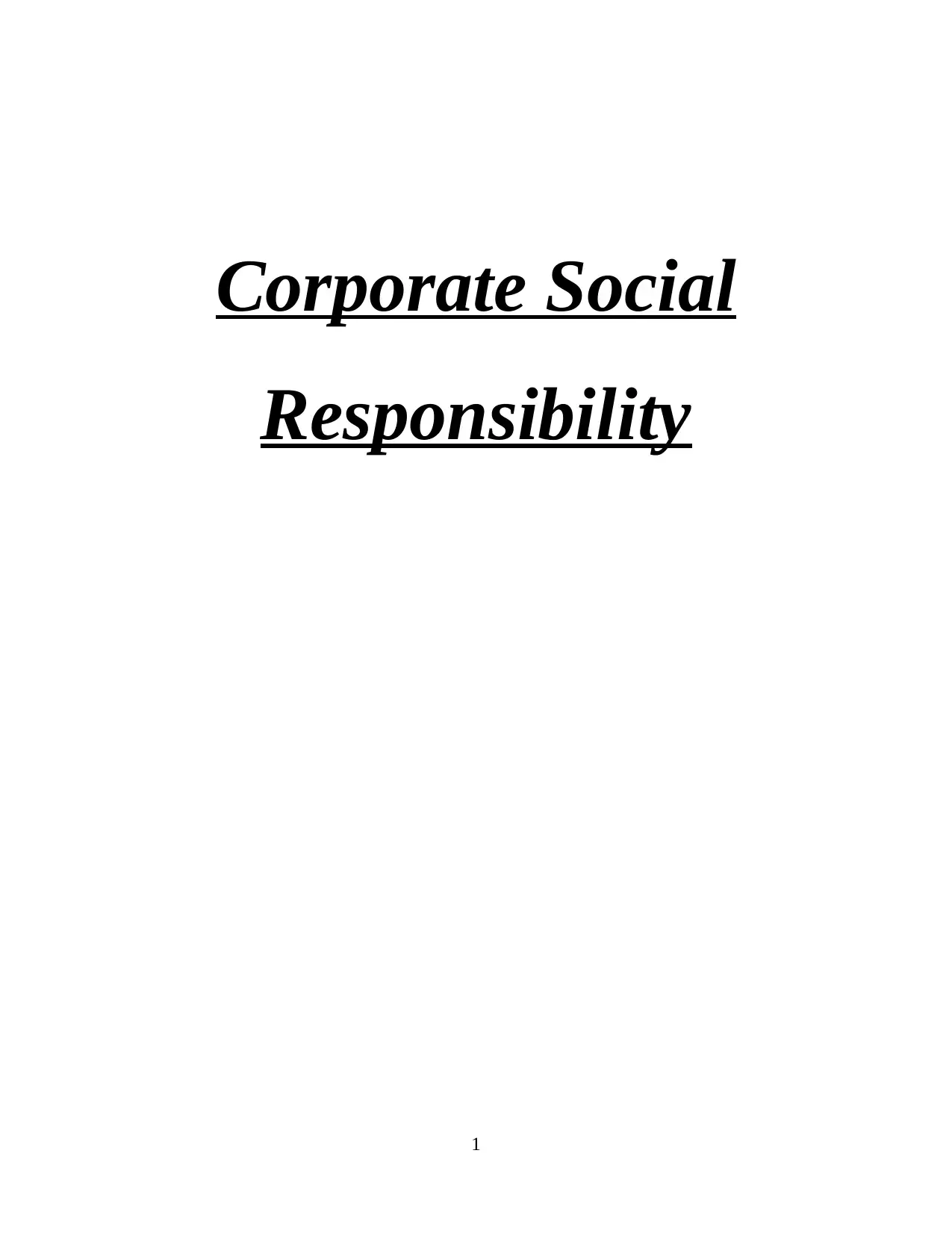
Corporate Social
Responsibility
1
Responsibility
1
Paraphrase This Document
Need a fresh take? Get an instant paraphrase of this document with our AI Paraphraser
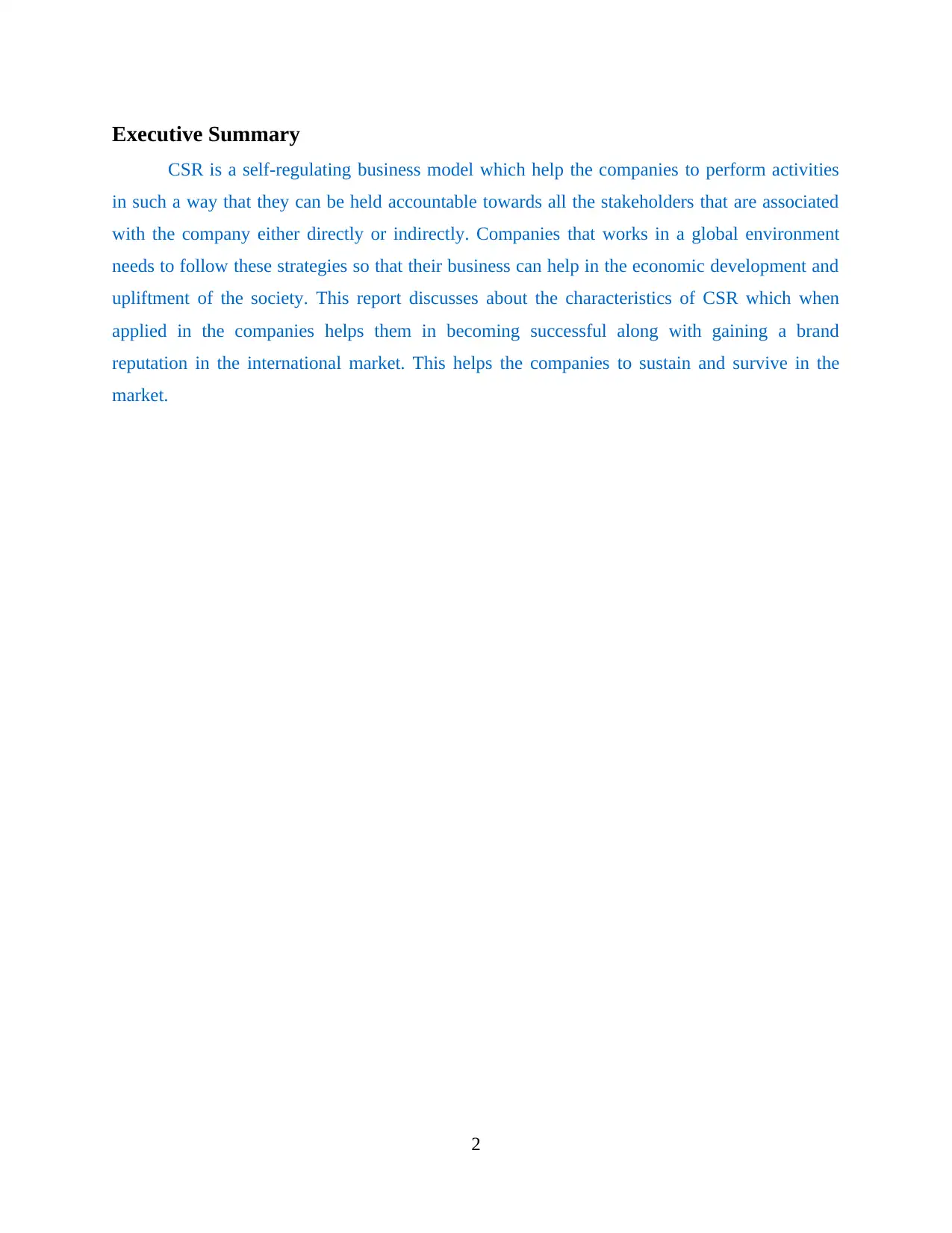
Executive Summary
CSR is a self-regulating business model which help the companies to perform activities
in such a way that they can be held accountable towards all the stakeholders that are associated
with the company either directly or indirectly. Companies that works in a global environment
needs to follow these strategies so that their business can help in the economic development and
upliftment of the society. This report discusses about the characteristics of CSR which when
applied in the companies helps them in becoming successful along with gaining a brand
reputation in the international market. This helps the companies to sustain and survive in the
market.
2
CSR is a self-regulating business model which help the companies to perform activities
in such a way that they can be held accountable towards all the stakeholders that are associated
with the company either directly or indirectly. Companies that works in a global environment
needs to follow these strategies so that their business can help in the economic development and
upliftment of the society. This report discusses about the characteristics of CSR which when
applied in the companies helps them in becoming successful along with gaining a brand
reputation in the international market. This helps the companies to sustain and survive in the
market.
2
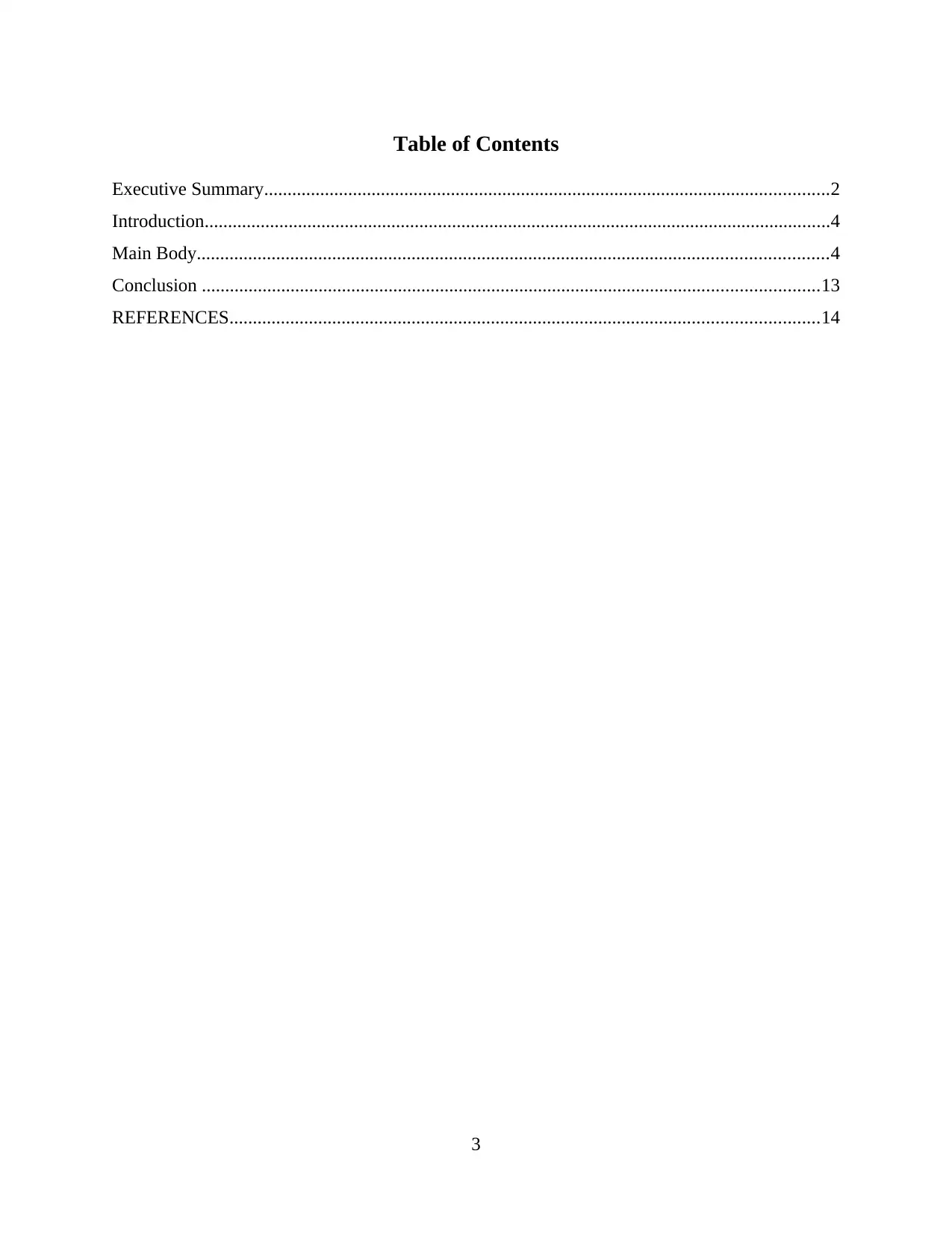
Table of Contents
Executive Summary.........................................................................................................................2
Introduction......................................................................................................................................4
Main Body.......................................................................................................................................4
Conclusion ....................................................................................................................................13
REFERENCES..............................................................................................................................14
3
Executive Summary.........................................................................................................................2
Introduction......................................................................................................................................4
Main Body.......................................................................................................................................4
Conclusion ....................................................................................................................................13
REFERENCES..............................................................................................................................14
3
⊘ This is a preview!⊘
Do you want full access?
Subscribe today to unlock all pages.

Trusted by 1+ million students worldwide
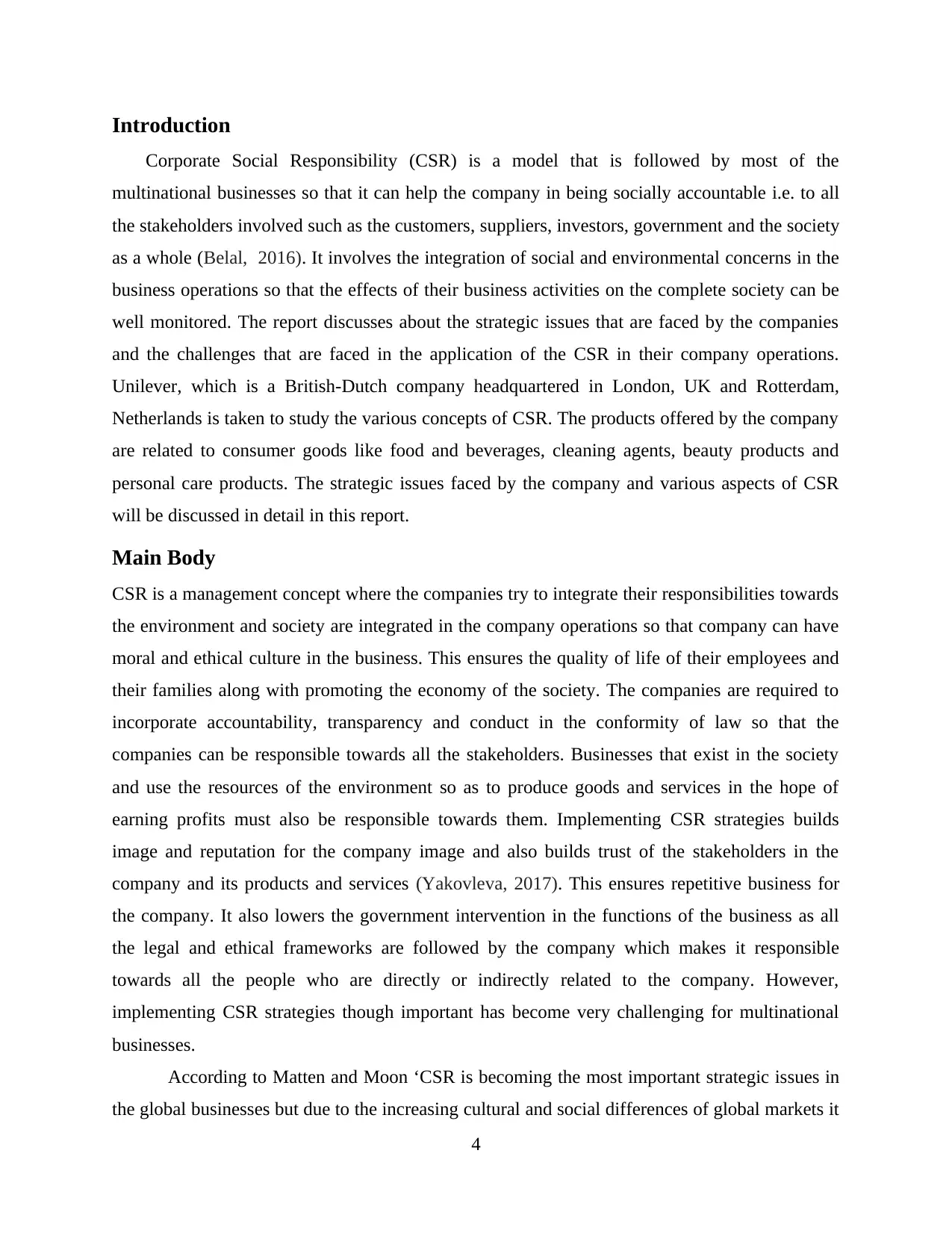
Introduction
Corporate Social Responsibility (CSR) is a model that is followed by most of the
multinational businesses so that it can help the company in being socially accountable i.e. to all
the stakeholders involved such as the customers, suppliers, investors, government and the society
as a whole (Belal, 2016). It involves the integration of social and environmental concerns in the
business operations so that the effects of their business activities on the complete society can be
well monitored. The report discusses about the strategic issues that are faced by the companies
and the challenges that are faced in the application of the CSR in their company operations.
Unilever, which is a British-Dutch company headquartered in London, UK and Rotterdam,
Netherlands is taken to study the various concepts of CSR. The products offered by the company
are related to consumer goods like food and beverages, cleaning agents, beauty products and
personal care products. The strategic issues faced by the company and various aspects of CSR
will be discussed in detail in this report.
Main Body
CSR is a management concept where the companies try to integrate their responsibilities towards
the environment and society are integrated in the company operations so that company can have
moral and ethical culture in the business. This ensures the quality of life of their employees and
their families along with promoting the economy of the society. The companies are required to
incorporate accountability, transparency and conduct in the conformity of law so that the
companies can be responsible towards all the stakeholders. Businesses that exist in the society
and use the resources of the environment so as to produce goods and services in the hope of
earning profits must also be responsible towards them. Implementing CSR strategies builds
image and reputation for the company image and also builds trust of the stakeholders in the
company and its products and services (Yakovleva, 2017). This ensures repetitive business for
the company. It also lowers the government intervention in the functions of the business as all
the legal and ethical frameworks are followed by the company which makes it responsible
towards all the people who are directly or indirectly related to the company. However,
implementing CSR strategies though important has become very challenging for multinational
businesses.
According to Matten and Moon ‘CSR is becoming the most important strategic issues in
the global businesses but due to the increasing cultural and social differences of global markets it
4
Corporate Social Responsibility (CSR) is a model that is followed by most of the
multinational businesses so that it can help the company in being socially accountable i.e. to all
the stakeholders involved such as the customers, suppliers, investors, government and the society
as a whole (Belal, 2016). It involves the integration of social and environmental concerns in the
business operations so that the effects of their business activities on the complete society can be
well monitored. The report discusses about the strategic issues that are faced by the companies
and the challenges that are faced in the application of the CSR in their company operations.
Unilever, which is a British-Dutch company headquartered in London, UK and Rotterdam,
Netherlands is taken to study the various concepts of CSR. The products offered by the company
are related to consumer goods like food and beverages, cleaning agents, beauty products and
personal care products. The strategic issues faced by the company and various aspects of CSR
will be discussed in detail in this report.
Main Body
CSR is a management concept where the companies try to integrate their responsibilities towards
the environment and society are integrated in the company operations so that company can have
moral and ethical culture in the business. This ensures the quality of life of their employees and
their families along with promoting the economy of the society. The companies are required to
incorporate accountability, transparency and conduct in the conformity of law so that the
companies can be responsible towards all the stakeholders. Businesses that exist in the society
and use the resources of the environment so as to produce goods and services in the hope of
earning profits must also be responsible towards them. Implementing CSR strategies builds
image and reputation for the company image and also builds trust of the stakeholders in the
company and its products and services (Yakovleva, 2017). This ensures repetitive business for
the company. It also lowers the government intervention in the functions of the business as all
the legal and ethical frameworks are followed by the company which makes it responsible
towards all the people who are directly or indirectly related to the company. However,
implementing CSR strategies though important has become very challenging for multinational
businesses.
According to Matten and Moon ‘CSR is becoming the most important strategic issues in
the global businesses but due to the increasing cultural and social differences of global markets it
4
Paraphrase This Document
Need a fresh take? Get an instant paraphrase of this document with our AI Paraphraser
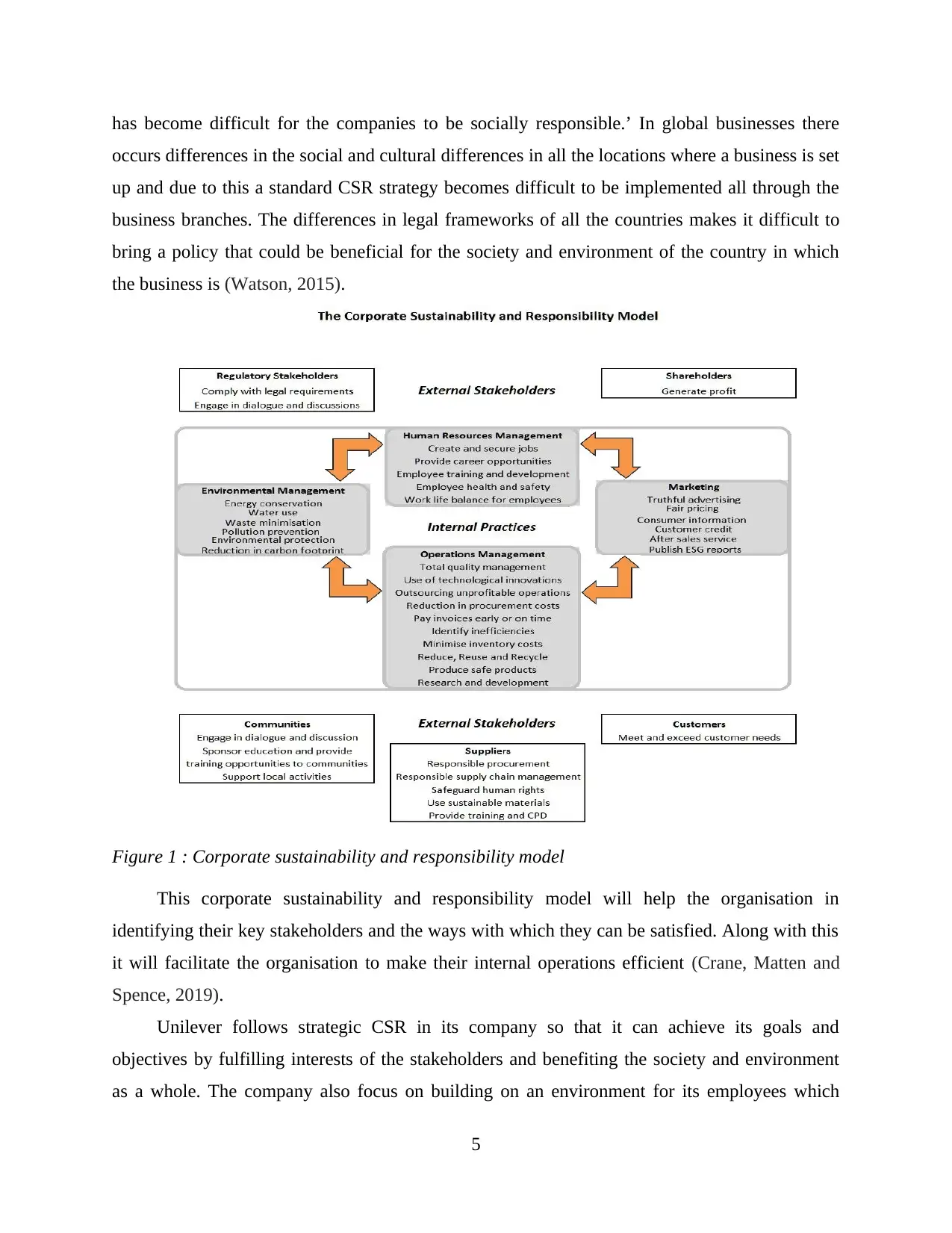
has become difficult for the companies to be socially responsible.’ In global businesses there
occurs differences in the social and cultural differences in all the locations where a business is set
up and due to this a standard CSR strategy becomes difficult to be implemented all through the
business branches. The differences in legal frameworks of all the countries makes it difficult to
bring a policy that could be beneficial for the society and environment of the country in which
the business is (Watson, 2015).
Figure 1 : Corporate sustainability and responsibility model
This corporate sustainability and responsibility model will help the organisation in
identifying their key stakeholders and the ways with which they can be satisfied. Along with this
it will facilitate the organisation to make their internal operations efficient (Crane, Matten and
Spence, 2019).
Unilever follows strategic CSR in its company so that it can achieve its goals and
objectives by fulfilling interests of the stakeholders and benefiting the society and environment
as a whole. The company also focus on building on an environment for its employees which
5
occurs differences in the social and cultural differences in all the locations where a business is set
up and due to this a standard CSR strategy becomes difficult to be implemented all through the
business branches. The differences in legal frameworks of all the countries makes it difficult to
bring a policy that could be beneficial for the society and environment of the country in which
the business is (Watson, 2015).
Figure 1 : Corporate sustainability and responsibility model
This corporate sustainability and responsibility model will help the organisation in
identifying their key stakeholders and the ways with which they can be satisfied. Along with this
it will facilitate the organisation to make their internal operations efficient (Crane, Matten and
Spence, 2019).
Unilever follows strategic CSR in its company so that it can achieve its goals and
objectives by fulfilling interests of the stakeholders and benefiting the society and environment
as a whole. The company also focus on building on an environment for its employees which
5
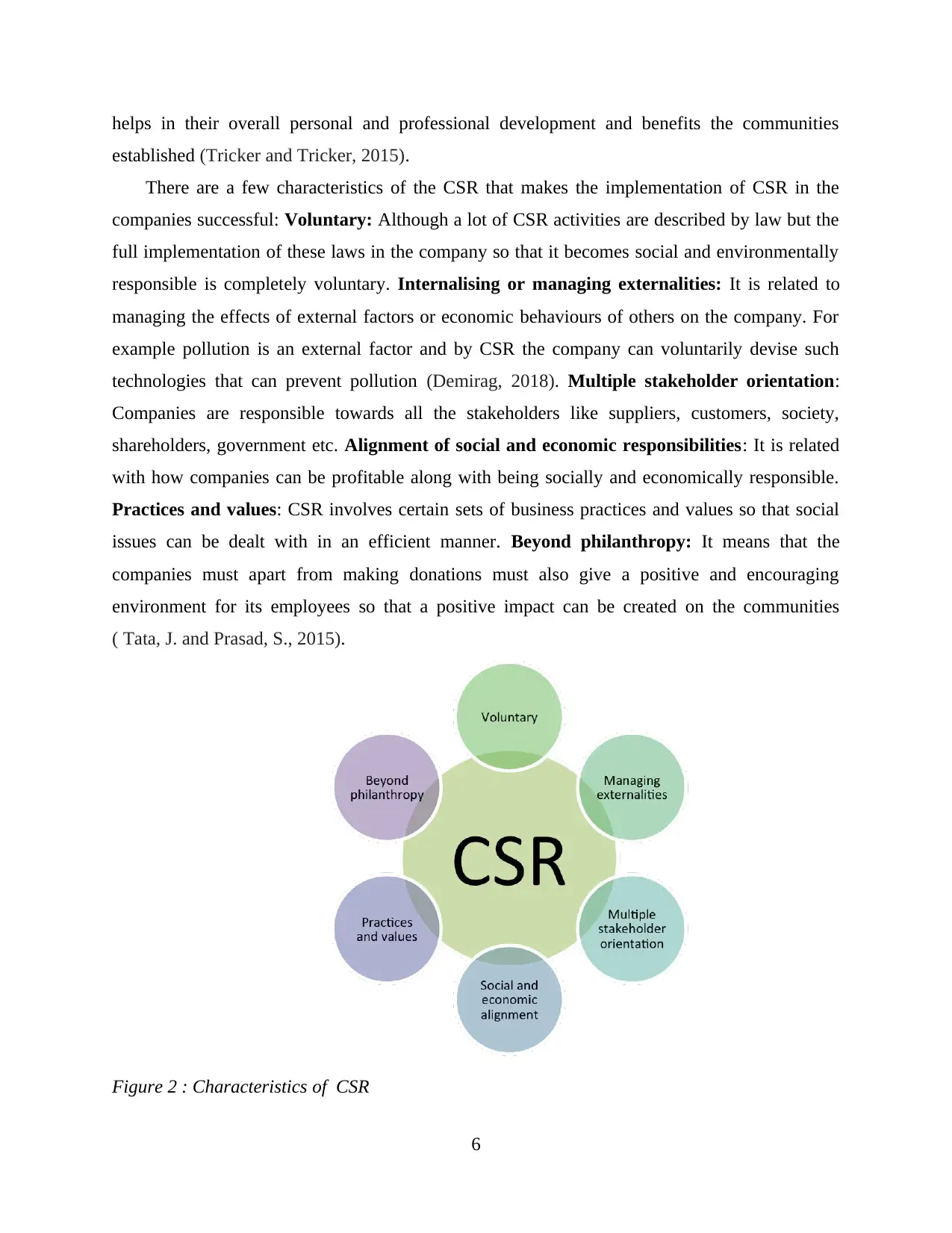
helps in their overall personal and professional development and benefits the communities
established (Tricker and Tricker, 2015).
There are a few characteristics of the CSR that makes the implementation of CSR in the
companies successful: Voluntary: Although a lot of CSR activities are described by law but the
full implementation of these laws in the company so that it becomes social and environmentally
responsible is completely voluntary. Internalising or managing externalities: It is related to
managing the effects of external factors or economic behaviours of others on the company. For
example pollution is an external factor and by CSR the company can voluntarily devise such
technologies that can prevent pollution (Demirag, 2018). Multiple stakeholder orientation:
Companies are responsible towards all the stakeholders like suppliers, customers, society,
shareholders, government etc. Alignment of social and economic responsibilities: It is related
with how companies can be profitable along with being socially and economically responsible.
Practices and values: CSR involves certain sets of business practices and values so that social
issues can be dealt with in an efficient manner. Beyond philanthropy: It means that the
companies must apart from making donations must also give a positive and encouraging
environment for its employees so that a positive impact can be created on the communities
( Tata, J. and Prasad, S., 2015).
Figure 2 : Characteristics of CSR
6
established (Tricker and Tricker, 2015).
There are a few characteristics of the CSR that makes the implementation of CSR in the
companies successful: Voluntary: Although a lot of CSR activities are described by law but the
full implementation of these laws in the company so that it becomes social and environmentally
responsible is completely voluntary. Internalising or managing externalities: It is related to
managing the effects of external factors or economic behaviours of others on the company. For
example pollution is an external factor and by CSR the company can voluntarily devise such
technologies that can prevent pollution (Demirag, 2018). Multiple stakeholder orientation:
Companies are responsible towards all the stakeholders like suppliers, customers, society,
shareholders, government etc. Alignment of social and economic responsibilities: It is related
with how companies can be profitable along with being socially and economically responsible.
Practices and values: CSR involves certain sets of business practices and values so that social
issues can be dealt with in an efficient manner. Beyond philanthropy: It means that the
companies must apart from making donations must also give a positive and encouraging
environment for its employees so that a positive impact can be created on the communities
( Tata, J. and Prasad, S., 2015).
Figure 2 : Characteristics of CSR
6
⊘ This is a preview!⊘
Do you want full access?
Subscribe today to unlock all pages.

Trusted by 1+ million students worldwide
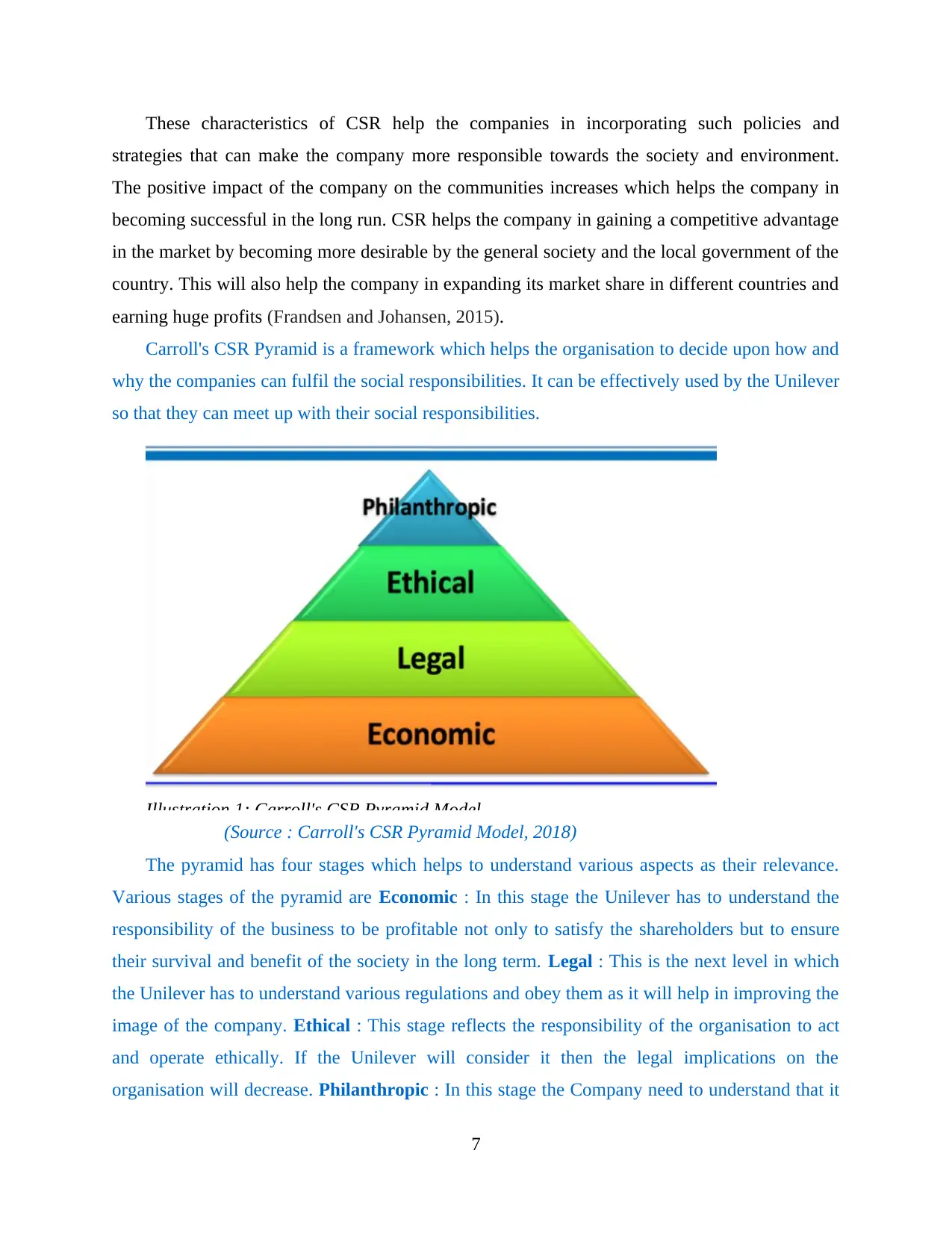
These characteristics of CSR help the companies in incorporating such policies and
strategies that can make the company more responsible towards the society and environment.
The positive impact of the company on the communities increases which helps the company in
becoming successful in the long run. CSR helps the company in gaining a competitive advantage
in the market by becoming more desirable by the general society and the local government of the
country. This will also help the company in expanding its market share in different countries and
earning huge profits (Frandsen and Johansen, 2015).
Carroll's CSR Pyramid is a framework which helps the organisation to decide upon how and
why the companies can fulfil the social responsibilities. It can be effectively used by the Unilever
so that they can meet up with their social responsibilities.
Illustration 1: Carroll's CSR Pyramid Model
(Source : Carroll's CSR Pyramid Model, 2018)
The pyramid has four stages which helps to understand various aspects as their relevance.
Various stages of the pyramid are Economic : In this stage the Unilever has to understand the
responsibility of the business to be profitable not only to satisfy the shareholders but to ensure
their survival and benefit of the society in the long term. Legal : This is the next level in which
the Unilever has to understand various regulations and obey them as it will help in improving the
image of the company. Ethical : This stage reflects the responsibility of the organisation to act
and operate ethically. If the Unilever will consider it then the legal implications on the
organisation will decrease. Philanthropic : In this stage the Company need to understand that it
7
strategies that can make the company more responsible towards the society and environment.
The positive impact of the company on the communities increases which helps the company in
becoming successful in the long run. CSR helps the company in gaining a competitive advantage
in the market by becoming more desirable by the general society and the local government of the
country. This will also help the company in expanding its market share in different countries and
earning huge profits (Frandsen and Johansen, 2015).
Carroll's CSR Pyramid is a framework which helps the organisation to decide upon how and
why the companies can fulfil the social responsibilities. It can be effectively used by the Unilever
so that they can meet up with their social responsibilities.
Illustration 1: Carroll's CSR Pyramid Model
(Source : Carroll's CSR Pyramid Model, 2018)
The pyramid has four stages which helps to understand various aspects as their relevance.
Various stages of the pyramid are Economic : In this stage the Unilever has to understand the
responsibility of the business to be profitable not only to satisfy the shareholders but to ensure
their survival and benefit of the society in the long term. Legal : This is the next level in which
the Unilever has to understand various regulations and obey them as it will help in improving the
image of the company. Ethical : This stage reflects the responsibility of the organisation to act
and operate ethically. If the Unilever will consider it then the legal implications on the
organisation will decrease. Philanthropic : In this stage the Company need to understand that it
7
Paraphrase This Document
Need a fresh take? Get an instant paraphrase of this document with our AI Paraphraser
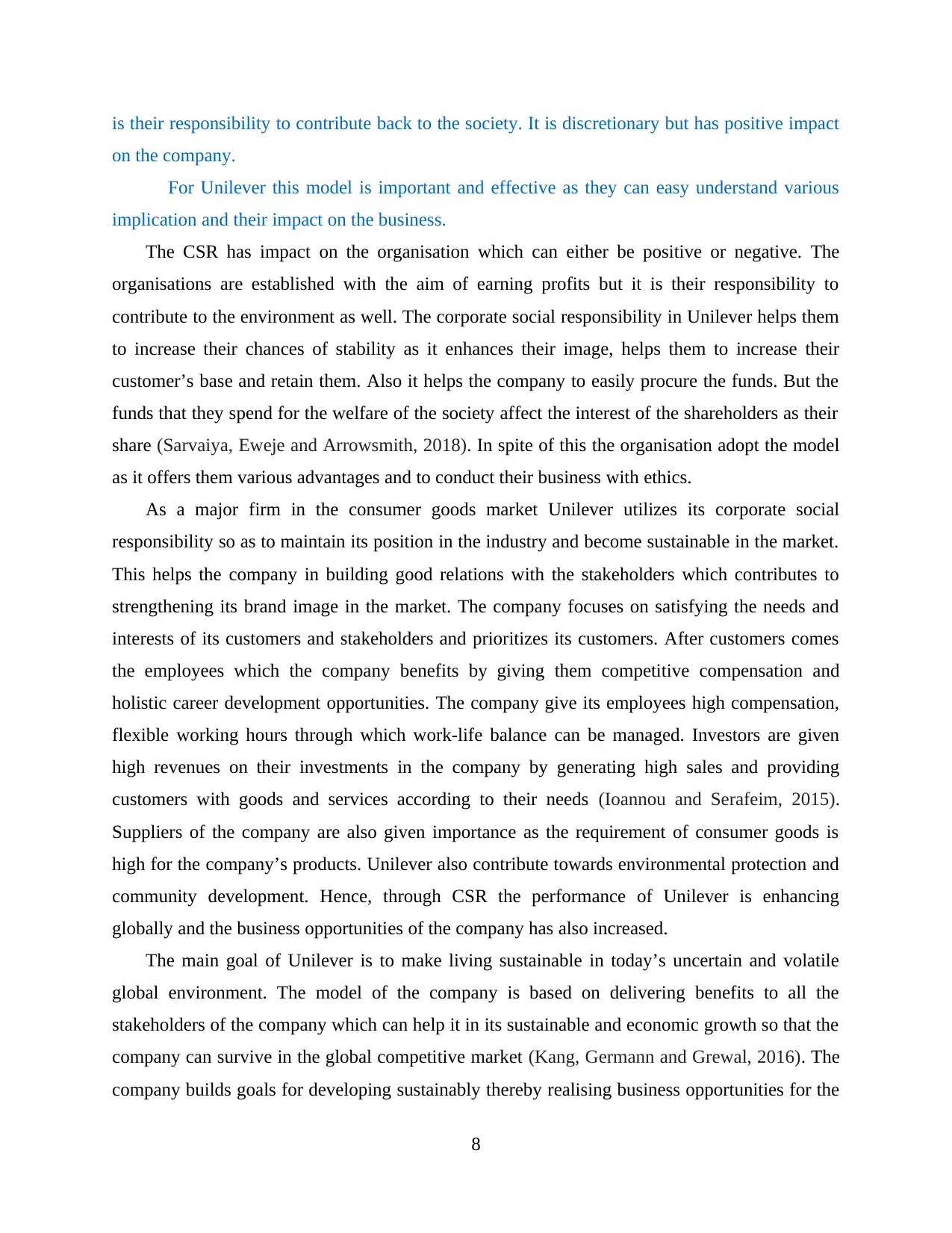
is their responsibility to contribute back to the society. It is discretionary but has positive impact
on the company.
For Unilever this model is important and effective as they can easy understand various
implication and their impact on the business.
The CSR has impact on the organisation which can either be positive or negative. The
organisations are established with the aim of earning profits but it is their responsibility to
contribute to the environment as well. The corporate social responsibility in Unilever helps them
to increase their chances of stability as it enhances their image, helps them to increase their
customer’s base and retain them. Also it helps the company to easily procure the funds. But the
funds that they spend for the welfare of the society affect the interest of the shareholders as their
share (Sarvaiya, Eweje and Arrowsmith, 2018). In spite of this the organisation adopt the model
as it offers them various advantages and to conduct their business with ethics.
As a major firm in the consumer goods market Unilever utilizes its corporate social
responsibility so as to maintain its position in the industry and become sustainable in the market.
This helps the company in building good relations with the stakeholders which contributes to
strengthening its brand image in the market. The company focuses on satisfying the needs and
interests of its customers and stakeholders and prioritizes its customers. After customers comes
the employees which the company benefits by giving them competitive compensation and
holistic career development opportunities. The company give its employees high compensation,
flexible working hours through which work-life balance can be managed. Investors are given
high revenues on their investments in the company by generating high sales and providing
customers with goods and services according to their needs (Ioannou and Serafeim, 2015).
Suppliers of the company are also given importance as the requirement of consumer goods is
high for the company’s products. Unilever also contribute towards environmental protection and
community development. Hence, through CSR the performance of Unilever is enhancing
globally and the business opportunities of the company has also increased.
The main goal of Unilever is to make living sustainable in today’s uncertain and volatile
global environment. The model of the company is based on delivering benefits to all the
stakeholders of the company which can help it in its sustainable and economic growth so that the
company can survive in the global competitive market (Kang, Germann and Grewal, 2016). The
company builds goals for developing sustainably thereby realising business opportunities for the
8
on the company.
For Unilever this model is important and effective as they can easy understand various
implication and their impact on the business.
The CSR has impact on the organisation which can either be positive or negative. The
organisations are established with the aim of earning profits but it is their responsibility to
contribute to the environment as well. The corporate social responsibility in Unilever helps them
to increase their chances of stability as it enhances their image, helps them to increase their
customer’s base and retain them. Also it helps the company to easily procure the funds. But the
funds that they spend for the welfare of the society affect the interest of the shareholders as their
share (Sarvaiya, Eweje and Arrowsmith, 2018). In spite of this the organisation adopt the model
as it offers them various advantages and to conduct their business with ethics.
As a major firm in the consumer goods market Unilever utilizes its corporate social
responsibility so as to maintain its position in the industry and become sustainable in the market.
This helps the company in building good relations with the stakeholders which contributes to
strengthening its brand image in the market. The company focuses on satisfying the needs and
interests of its customers and stakeholders and prioritizes its customers. After customers comes
the employees which the company benefits by giving them competitive compensation and
holistic career development opportunities. The company give its employees high compensation,
flexible working hours through which work-life balance can be managed. Investors are given
high revenues on their investments in the company by generating high sales and providing
customers with goods and services according to their needs (Ioannou and Serafeim, 2015).
Suppliers of the company are also given importance as the requirement of consumer goods is
high for the company’s products. Unilever also contribute towards environmental protection and
community development. Hence, through CSR the performance of Unilever is enhancing
globally and the business opportunities of the company has also increased.
The main goal of Unilever is to make living sustainable in today’s uncertain and volatile
global environment. The model of the company is based on delivering benefits to all the
stakeholders of the company which can help it in its sustainable and economic growth so that the
company can survive in the global competitive market (Kang, Germann and Grewal, 2016). The
company builds goals for developing sustainably thereby realising business opportunities for the
8
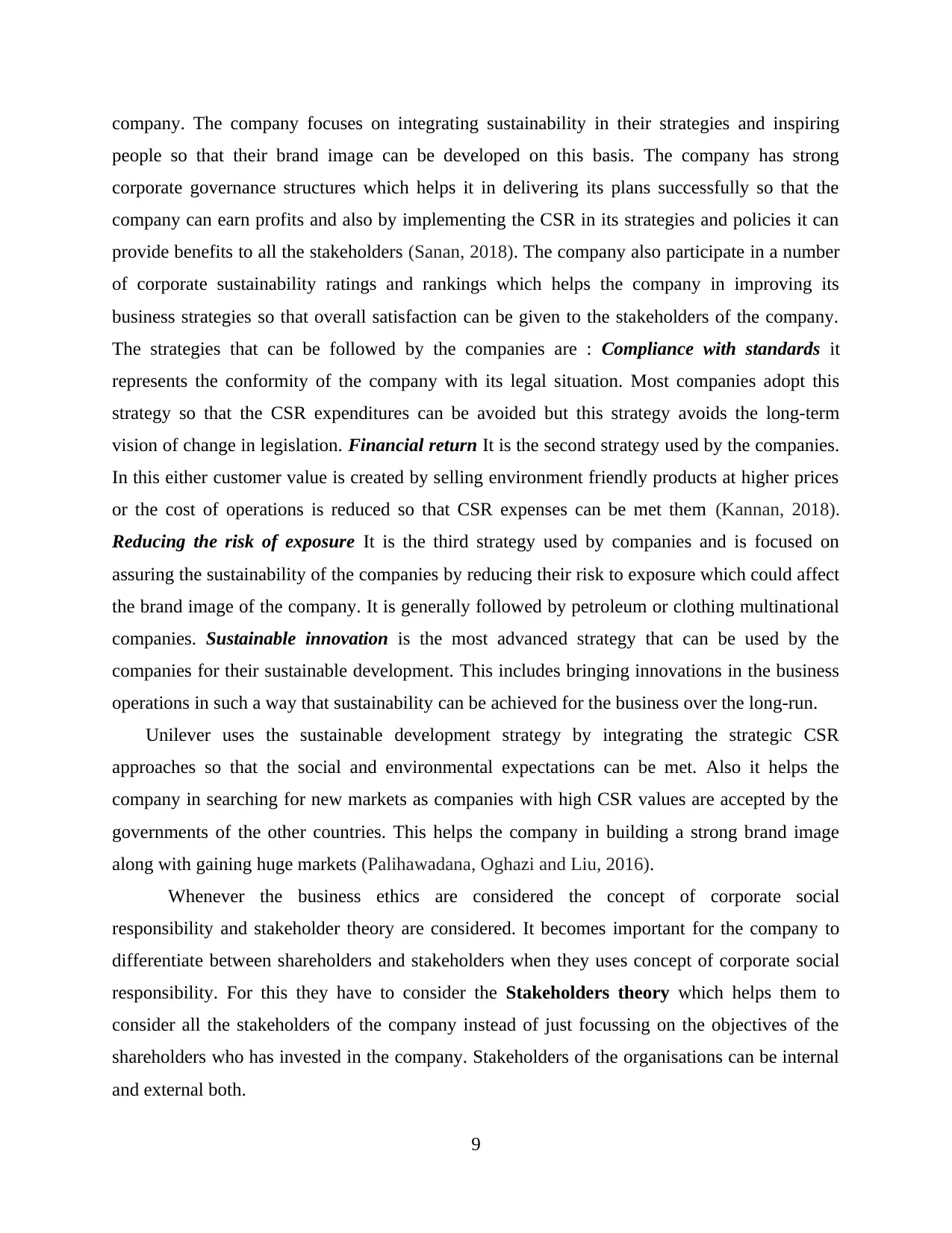
company. The company focuses on integrating sustainability in their strategies and inspiring
people so that their brand image can be developed on this basis. The company has strong
corporate governance structures which helps it in delivering its plans successfully so that the
company can earn profits and also by implementing the CSR in its strategies and policies it can
provide benefits to all the stakeholders (Sanan, 2018). The company also participate in a number
of corporate sustainability ratings and rankings which helps the company in improving its
business strategies so that overall satisfaction can be given to the stakeholders of the company.
The strategies that can be followed by the companies are : Compliance with standards it
represents the conformity of the company with its legal situation. Most companies adopt this
strategy so that the CSR expenditures can be avoided but this strategy avoids the long-term
vision of change in legislation. Financial return It is the second strategy used by the companies.
In this either customer value is created by selling environment friendly products at higher prices
or the cost of operations is reduced so that CSR expenses can be met them (Kannan, 2018).
Reducing the risk of exposure It is the third strategy used by companies and is focused on
assuring the sustainability of the companies by reducing their risk to exposure which could affect
the brand image of the company. It is generally followed by petroleum or clothing multinational
companies. Sustainable innovation is the most advanced strategy that can be used by the
companies for their sustainable development. This includes bringing innovations in the business
operations in such a way that sustainability can be achieved for the business over the long-run.
Unilever uses the sustainable development strategy by integrating the strategic CSR
approaches so that the social and environmental expectations can be met. Also it helps the
company in searching for new markets as companies with high CSR values are accepted by the
governments of the other countries. This helps the company in building a strong brand image
along with gaining huge markets (Palihawadana, Oghazi and Liu, 2016).
Whenever the business ethics are considered the concept of corporate social
responsibility and stakeholder theory are considered. It becomes important for the company to
differentiate between shareholders and stakeholders when they uses concept of corporate social
responsibility. For this they have to consider the Stakeholders theory which helps them to
consider all the stakeholders of the company instead of just focussing on the objectives of the
shareholders who has invested in the company. Stakeholders of the organisations can be internal
and external both.
9
people so that their brand image can be developed on this basis. The company has strong
corporate governance structures which helps it in delivering its plans successfully so that the
company can earn profits and also by implementing the CSR in its strategies and policies it can
provide benefits to all the stakeholders (Sanan, 2018). The company also participate in a number
of corporate sustainability ratings and rankings which helps the company in improving its
business strategies so that overall satisfaction can be given to the stakeholders of the company.
The strategies that can be followed by the companies are : Compliance with standards it
represents the conformity of the company with its legal situation. Most companies adopt this
strategy so that the CSR expenditures can be avoided but this strategy avoids the long-term
vision of change in legislation. Financial return It is the second strategy used by the companies.
In this either customer value is created by selling environment friendly products at higher prices
or the cost of operations is reduced so that CSR expenses can be met them (Kannan, 2018).
Reducing the risk of exposure It is the third strategy used by companies and is focused on
assuring the sustainability of the companies by reducing their risk to exposure which could affect
the brand image of the company. It is generally followed by petroleum or clothing multinational
companies. Sustainable innovation is the most advanced strategy that can be used by the
companies for their sustainable development. This includes bringing innovations in the business
operations in such a way that sustainability can be achieved for the business over the long-run.
Unilever uses the sustainable development strategy by integrating the strategic CSR
approaches so that the social and environmental expectations can be met. Also it helps the
company in searching for new markets as companies with high CSR values are accepted by the
governments of the other countries. This helps the company in building a strong brand image
along with gaining huge markets (Palihawadana, Oghazi and Liu, 2016).
Whenever the business ethics are considered the concept of corporate social
responsibility and stakeholder theory are considered. It becomes important for the company to
differentiate between shareholders and stakeholders when they uses concept of corporate social
responsibility. For this they have to consider the Stakeholders theory which helps them to
consider all the stakeholders of the company instead of just focussing on the objectives of the
shareholders who has invested in the company. Stakeholders of the organisations can be internal
and external both.
9
⊘ This is a preview!⊘
Do you want full access?
Subscribe today to unlock all pages.

Trusted by 1+ million students worldwide
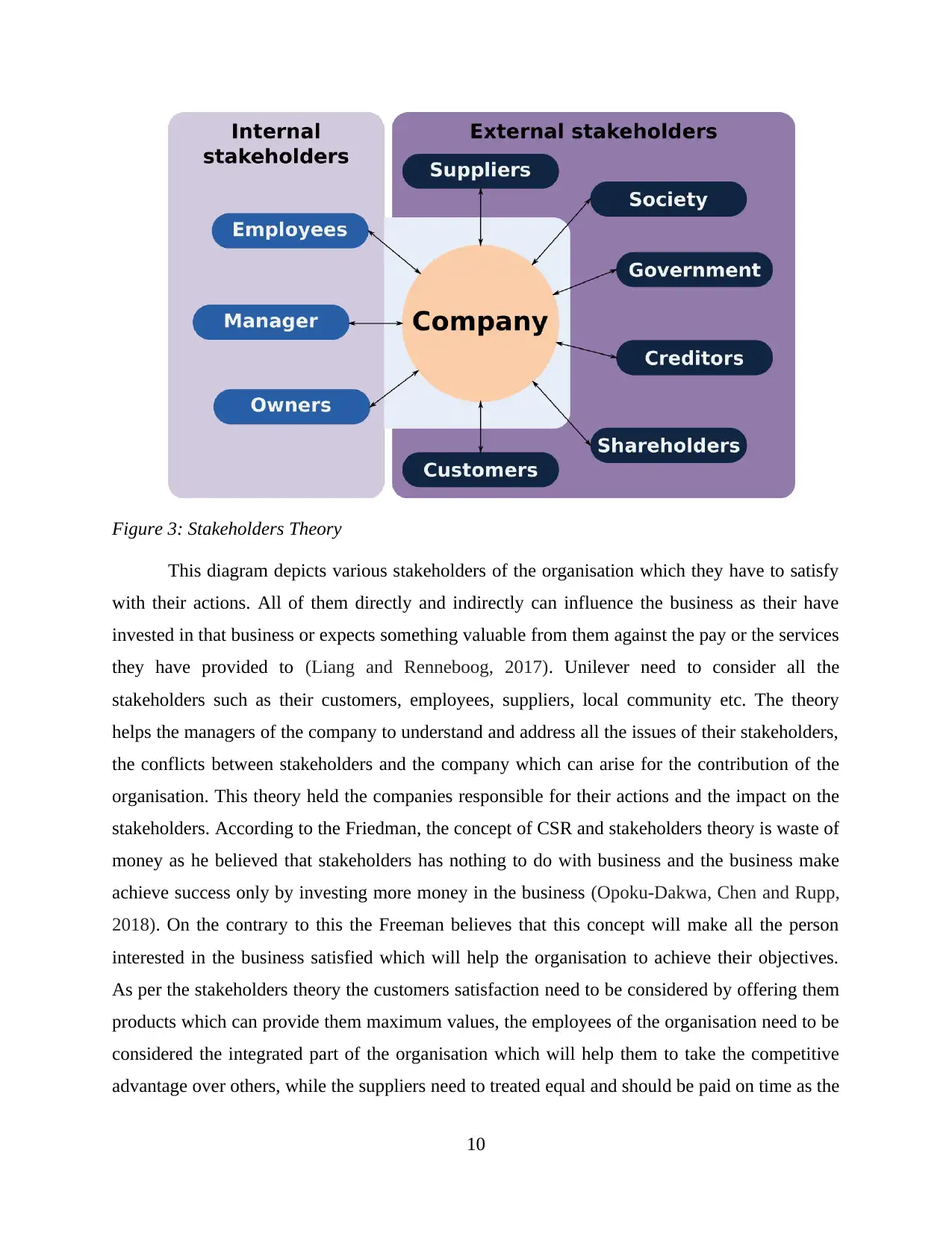
Figure 3: Stakeholders Theory
This diagram depicts various stakeholders of the organisation which they have to satisfy
with their actions. All of them directly and indirectly can influence the business as their have
invested in that business or expects something valuable from them against the pay or the services
they have provided to (Liang and Renneboog, 2017). Unilever need to consider all the
stakeholders such as their customers, employees, suppliers, local community etc. The theory
helps the managers of the company to understand and address all the issues of their stakeholders,
the conflicts between stakeholders and the company which can arise for the contribution of the
organisation. This theory held the companies responsible for their actions and the impact on the
stakeholders. According to the Friedman, the concept of CSR and stakeholders theory is waste of
money as he believed that stakeholders has nothing to do with business and the business make
achieve success only by investing more money in the business (Opoku‐Dakwa, Chen and Rupp,
2018). On the contrary to this the Freeman believes that this concept will make all the person
interested in the business satisfied which will help the organisation to achieve their objectives.
As per the stakeholders theory the customers satisfaction need to be considered by offering them
products which can provide them maximum values, the employees of the organisation need to be
considered the integrated part of the organisation which will help them to take the competitive
advantage over others, while the suppliers need to treated equal and should be paid on time as the
10
This diagram depicts various stakeholders of the organisation which they have to satisfy
with their actions. All of them directly and indirectly can influence the business as their have
invested in that business or expects something valuable from them against the pay or the services
they have provided to (Liang and Renneboog, 2017). Unilever need to consider all the
stakeholders such as their customers, employees, suppliers, local community etc. The theory
helps the managers of the company to understand and address all the issues of their stakeholders,
the conflicts between stakeholders and the company which can arise for the contribution of the
organisation. This theory held the companies responsible for their actions and the impact on the
stakeholders. According to the Friedman, the concept of CSR and stakeholders theory is waste of
money as he believed that stakeholders has nothing to do with business and the business make
achieve success only by investing more money in the business (Opoku‐Dakwa, Chen and Rupp,
2018). On the contrary to this the Freeman believes that this concept will make all the person
interested in the business satisfied which will help the organisation to achieve their objectives.
As per the stakeholders theory the customers satisfaction need to be considered by offering them
products which can provide them maximum values, the employees of the organisation need to be
considered the integrated part of the organisation which will help them to take the competitive
advantage over others, while the suppliers need to treated equal and should be paid on time as the
10
Paraphrase This Document
Need a fresh take? Get an instant paraphrase of this document with our AI Paraphraser
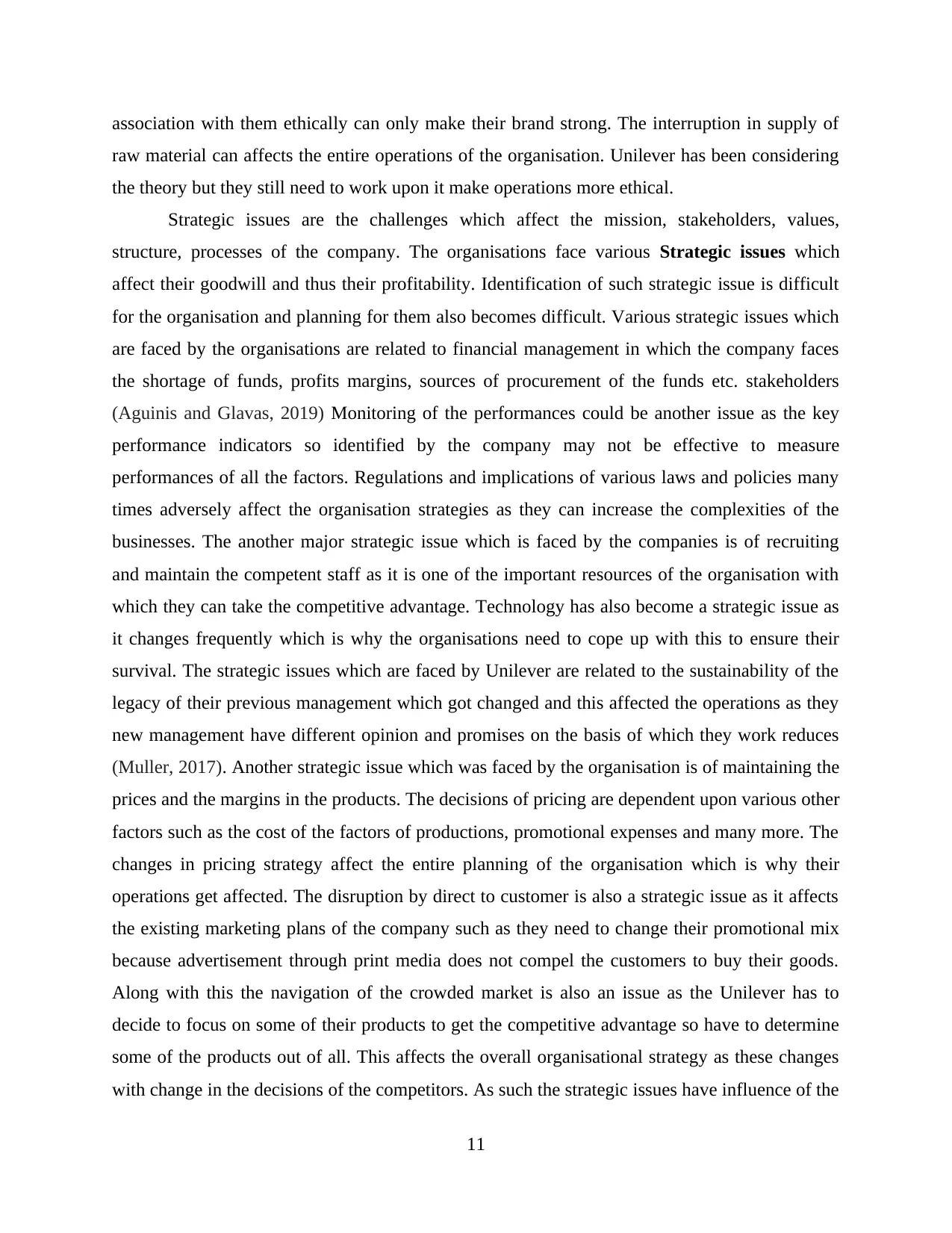
association with them ethically can only make their brand strong. The interruption in supply of
raw material can affects the entire operations of the organisation. Unilever has been considering
the theory but they still need to work upon it make operations more ethical.
Strategic issues are the challenges which affect the mission, stakeholders, values,
structure, processes of the company. The organisations face various Strategic issues which
affect their goodwill and thus their profitability. Identification of such strategic issue is difficult
for the organisation and planning for them also becomes difficult. Various strategic issues which
are faced by the organisations are related to financial management in which the company faces
the shortage of funds, profits margins, sources of procurement of the funds etc. stakeholders
(Aguinis and Glavas, 2019) Monitoring of the performances could be another issue as the key
performance indicators so identified by the company may not be effective to measure
performances of all the factors. Regulations and implications of various laws and policies many
times adversely affect the organisation strategies as they can increase the complexities of the
businesses. The another major strategic issue which is faced by the companies is of recruiting
and maintain the competent staff as it is one of the important resources of the organisation with
which they can take the competitive advantage. Technology has also become a strategic issue as
it changes frequently which is why the organisations need to cope up with this to ensure their
survival. The strategic issues which are faced by Unilever are related to the sustainability of the
legacy of their previous management which got changed and this affected the operations as they
new management have different opinion and promises on the basis of which they work reduces
(Muller, 2017). Another strategic issue which was faced by the organisation is of maintaining the
prices and the margins in the products. The decisions of pricing are dependent upon various other
factors such as the cost of the factors of productions, promotional expenses and many more. The
changes in pricing strategy affect the entire planning of the organisation which is why their
operations get affected. The disruption by direct to customer is also a strategic issue as it affects
the existing marketing plans of the company such as they need to change their promotional mix
because advertisement through print media does not compel the customers to buy their goods.
Along with this the navigation of the crowded market is also an issue as the Unilever has to
decide to focus on some of their products to get the competitive advantage so have to determine
some of the products out of all. This affects the overall organisational strategy as these changes
with change in the decisions of the competitors. As such the strategic issues have influence of the
11
raw material can affects the entire operations of the organisation. Unilever has been considering
the theory but they still need to work upon it make operations more ethical.
Strategic issues are the challenges which affect the mission, stakeholders, values,
structure, processes of the company. The organisations face various Strategic issues which
affect their goodwill and thus their profitability. Identification of such strategic issue is difficult
for the organisation and planning for them also becomes difficult. Various strategic issues which
are faced by the organisations are related to financial management in which the company faces
the shortage of funds, profits margins, sources of procurement of the funds etc. stakeholders
(Aguinis and Glavas, 2019) Monitoring of the performances could be another issue as the key
performance indicators so identified by the company may not be effective to measure
performances of all the factors. Regulations and implications of various laws and policies many
times adversely affect the organisation strategies as they can increase the complexities of the
businesses. The another major strategic issue which is faced by the companies is of recruiting
and maintain the competent staff as it is one of the important resources of the organisation with
which they can take the competitive advantage. Technology has also become a strategic issue as
it changes frequently which is why the organisations need to cope up with this to ensure their
survival. The strategic issues which are faced by Unilever are related to the sustainability of the
legacy of their previous management which got changed and this affected the operations as they
new management have different opinion and promises on the basis of which they work reduces
(Muller, 2017). Another strategic issue which was faced by the organisation is of maintaining the
prices and the margins in the products. The decisions of pricing are dependent upon various other
factors such as the cost of the factors of productions, promotional expenses and many more. The
changes in pricing strategy affect the entire planning of the organisation which is why their
operations get affected. The disruption by direct to customer is also a strategic issue as it affects
the existing marketing plans of the company such as they need to change their promotional mix
because advertisement through print media does not compel the customers to buy their goods.
Along with this the navigation of the crowded market is also an issue as the Unilever has to
decide to focus on some of their products to get the competitive advantage so have to determine
some of the products out of all. This affects the overall organisational strategy as these changes
with change in the decisions of the competitors. As such the strategic issues have influence of the
11
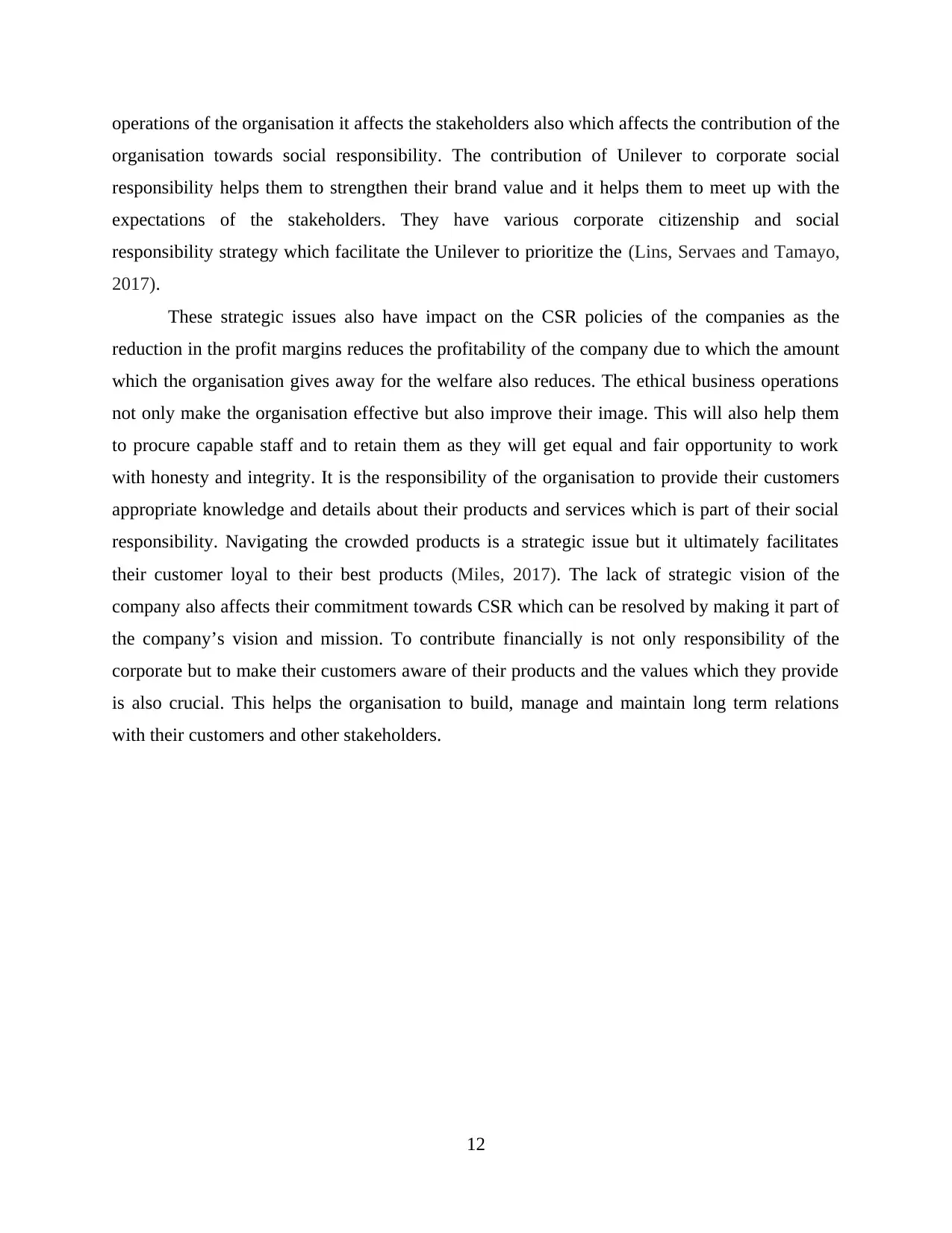
operations of the organisation it affects the stakeholders also which affects the contribution of the
organisation towards social responsibility. The contribution of Unilever to corporate social
responsibility helps them to strengthen their brand value and it helps them to meet up with the
expectations of the stakeholders. They have various corporate citizenship and social
responsibility strategy which facilitate the Unilever to prioritize the (Lins, Servaes and Tamayo,
2017).
These strategic issues also have impact on the CSR policies of the companies as the
reduction in the profit margins reduces the profitability of the company due to which the amount
which the organisation gives away for the welfare also reduces. The ethical business operations
not only make the organisation effective but also improve their image. This will also help them
to procure capable staff and to retain them as they will get equal and fair opportunity to work
with honesty and integrity. It is the responsibility of the organisation to provide their customers
appropriate knowledge and details about their products and services which is part of their social
responsibility. Navigating the crowded products is a strategic issue but it ultimately facilitates
their customer loyal to their best products (Miles, 2017). The lack of strategic vision of the
company also affects their commitment towards CSR which can be resolved by making it part of
the company’s vision and mission. To contribute financially is not only responsibility of the
corporate but to make their customers aware of their products and the values which they provide
is also crucial. This helps the organisation to build, manage and maintain long term relations
with their customers and other stakeholders.
12
organisation towards social responsibility. The contribution of Unilever to corporate social
responsibility helps them to strengthen their brand value and it helps them to meet up with the
expectations of the stakeholders. They have various corporate citizenship and social
responsibility strategy which facilitate the Unilever to prioritize the (Lins, Servaes and Tamayo,
2017).
These strategic issues also have impact on the CSR policies of the companies as the
reduction in the profit margins reduces the profitability of the company due to which the amount
which the organisation gives away for the welfare also reduces. The ethical business operations
not only make the organisation effective but also improve their image. This will also help them
to procure capable staff and to retain them as they will get equal and fair opportunity to work
with honesty and integrity. It is the responsibility of the organisation to provide their customers
appropriate knowledge and details about their products and services which is part of their social
responsibility. Navigating the crowded products is a strategic issue but it ultimately facilitates
their customer loyal to their best products (Miles, 2017). The lack of strategic vision of the
company also affects their commitment towards CSR which can be resolved by making it part of
the company’s vision and mission. To contribute financially is not only responsibility of the
corporate but to make their customers aware of their products and the values which they provide
is also crucial. This helps the organisation to build, manage and maintain long term relations
with their customers and other stakeholders.
12
⊘ This is a preview!⊘
Do you want full access?
Subscribe today to unlock all pages.

Trusted by 1+ million students worldwide
1 out of 15
Related Documents
Your All-in-One AI-Powered Toolkit for Academic Success.
+13062052269
info@desklib.com
Available 24*7 on WhatsApp / Email
![[object Object]](/_next/static/media/star-bottom.7253800d.svg)
Unlock your academic potential
Copyright © 2020–2026 A2Z Services. All Rights Reserved. Developed and managed by ZUCOL.



